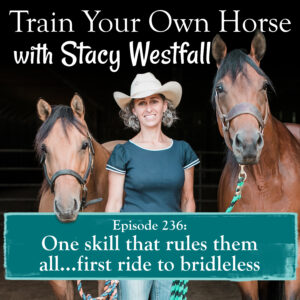Episode 236: One skill that rules them all…first ride to bridleless

Confidence and self-confidence are both important.
But if one skill rules them all, it is the belief that you can trust yourself.
Confidence comes from a Latin word which means “to trust”; therefore, having self-confidence is having trust in oneself.
Self-confidence is an emotion that you generate without any history to back it up or external evidence. It’s based on the belief you have about yourself. It comes from thoughts like, “I will figure this out.”
Confidence is supported by experience and external evidence.
In this episode, I use the simple example of haltering a horse to illustrate how many times riders begin to collect evidence AGAINST themselves if they are not mindful of their thoughts.
As I talk through the haltering example, imagine how something more complex like riding is full of these opportunities.
At the end, I offer a physical experiment you can do to teach yourself to watch your thoughts more closely. You’ll need ten pennies or pebbles and some increased awareness.
1 Comments
Leave a Comment
SUBSCRIBE TO THE PODCAST HERE:





YOURS FREE
WHY IS MY HORSE...?


I can ride all my schooled horse without a bridle. I usually ride with a bridle and with totally loose reins in case of accidents – we are in Africa and I often ride in a game reserve so wildlife can dart out suddenly.
Please tell be the best way to ride holding a flag.